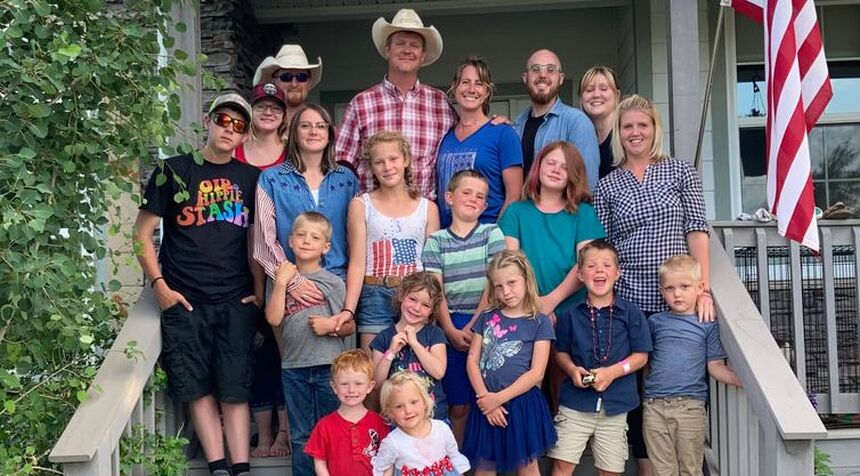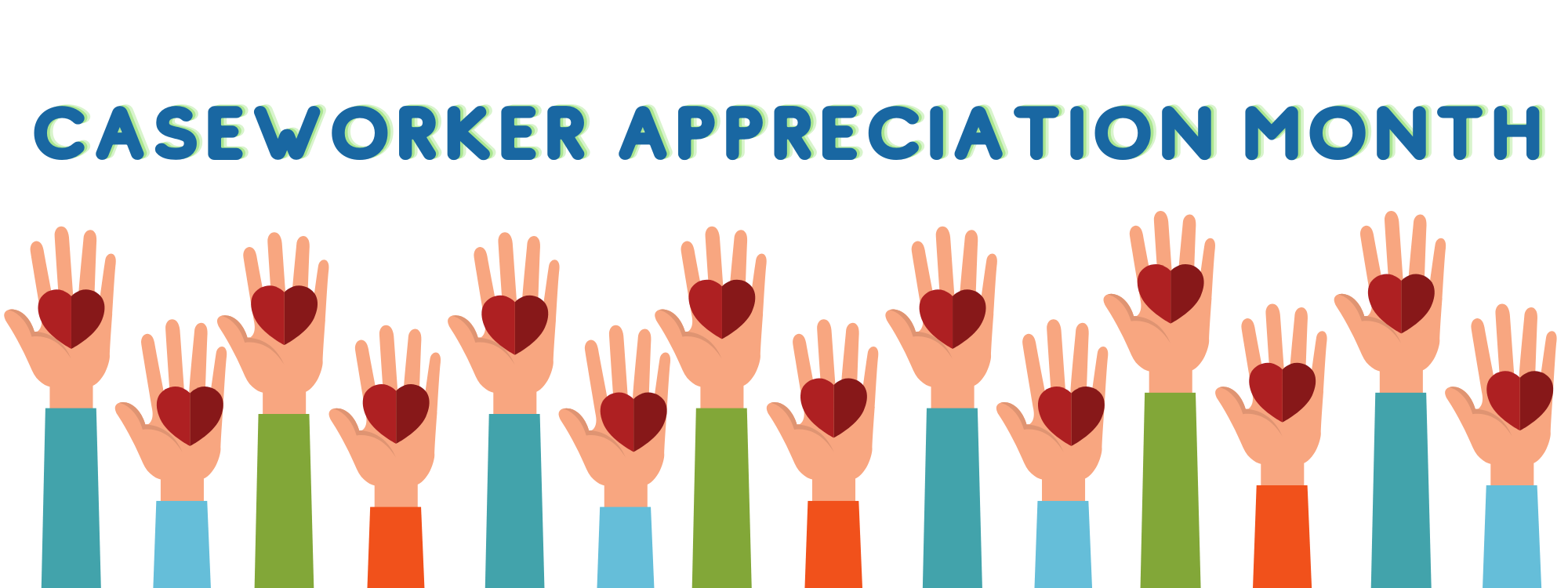|
As a kid, I attended church two or three times each week. I learned Scripture passages and hymns. But thanks to the life of our church community, I learned something equally important: that God loves me, people love me, and I can offer love, too. Weekly announcements from the pulpit let us know what needed to be done and rallied folks to fill the need with love. I learned that when someone has a baby, a chronic illness, or an infamous California wildfire threatening their home, love isn't just words. It's a meal, a hug, a safe place to evacuate, a loaned car, an invite to a family BBQ, and a hundred other uniquely helpful things.
When I grew up and became a foster mom, I quickly realized that not every child enters life with that expectation of help in times of trouble. Some expect stress upon stress. That lack of community goes beyond a brain-knowledge, but sinks deep into a child's body, telling them that the world isn't safe or friendly. Some biological and foster families I met as a young foster mom didn't even have ONE person, let alone a community, to call on a hard day. I wanted to share the wealth of support I'd grown to expect with this foster parent circle I'd just joined. Seven years into the Neighbor Program, some of our most enthusiastic volunteers come from churches. These volunteers want to extend their social circles to love and include foster and kinship families in crisis. My childhood church friend, Christy Luis, volunteered with another friend to tag-team as Neighbors for a large foster family. "I have enjoyed creating desserts and healthy dinners for the family so much that I almost feel as though the Neighbor Program serves me as much as it serves the foster family. I am partially disabled by chronic pain and can’t volunteer in many capacities, but the Neighbor Program accommodated my situation. It means a lot for me to be able to serve a deserving family, even in such a limited way!" Regan is a member of my church and a recent graduate of the Neighbor program. When we matched her with the H family, we happily realized that Regan's workplace is across the street from their home! She usually brings them a meal every other Thursday (though the commitment is only once a month) and doubles the recipe so they have leftovers or can freeze a meal. The family includes one child with several unique food allergies, so Regan found creative new recipes that avoided the problem foods while giving the family something they hadn't tried and could all enjoy. When the Harms took in an infant on short notice, Regan enjoyed doing a little "baby shopping" and left a care package for the family. She tells us that it feels great to support children in foster care as a Neighbor to the whole family. If you want to share love beyond the walls of your church, please email me at hforti@project127.org, and we'll get you connected with a foster or kinship family. By Hope Forti, Neighbor Program Founder and Director
0 Comments
In September, we honor kinship caregivers who provide love and safety for a child and preserve important family bonds. We hold you in high regard!
For many years, I thought being a foster parent and a kinship provider were the same because both involved parenting other people’s children. Boy, was I wrong! Recent events have challenged a few of my thoughts. Earlier this summer, I was privileged to provide diapers to a 68-year-old grandma raising her 3-year-old granddaughter. This beautiful soul invited me into her home and began sharing why she chose to step into this awkward and challenging space to care for her beautiful young grandchild, even at her advanced age. For the next half hour, she shared about the life she gave up to care for her grandchild and how she had zero regrets for choosing to prioritize her granddaughter's safety over the simple life she had previously enjoyed. In listening to her story, I realized then that her life changed in an instant. She didn't plan to become a foster parent or undergo a lengthy certification process, slowly preparing for a child to enter her home. She was asked to care for her granddaughter without advanced notice or time for planning or preparation. She chose to parent again because she understood the trauma that was experienced by this child, and the thought of a stranger raising this child broke her heart. She has found so much joy in parenting her grandchild, that she wants to encourage others who are older not to shy away from becoming a kinship provider. In stepping into her role as "mom" rather than "grandma," she gave up her freedom (time and financial) to do as she pleases. She gets weird looks when she states that she is "mom" and finds that navigating the boundaries that kinship requires can be tricky and hard, especially the tension (and beauty) of trying to maintain a relationship with her own child while raising that child's child. In the state of Colorado, there are currently 12,485 grandparents caring for their grandchildren. Kinship caregivers can be relatives, friends, neighbors, or other people with a significant relationship to a child, youth, or family. Placing a child with a kinship caregiver is less traumatic than placing a child with a stranger, so when children or youth cannot remain safely at home, a county or agency will seek out kinship caregivers before moving a child into a foster home. Kinship providers may not have access to the same resources as foster families. If a kinship caregiver chooses to go through the foster care certification process, they will have access to more resources than those who do not. Kinship providers are also tasked with navigating complex family dynamics and relationships. Project 1.27 supports and encourages kinship caregivers by providing diapers, access to foster closets, training, and community. If you are or know a kinship caregiver, here are some tips that can support positive outcomes for children in kinship families-
If only there was a magic pill we could give our kids to get them to open up about what they are feeling. But anyone who has parented a teenager knows that no matter how much we try on our end, their free will (some might say stubbornness) still plays a part in whether they share what’s going on in their lives. Here are a few strategies I’ve gathered from other parents of teens that I’ve found helpful in getting teens in my home to open up (even just a little).
Ask open-ended questions (and yes, even their opinions.) Yes/no questions can start to feel like an interview or, worse, an interrogation. That’s not the vibe we’re going for. Open-ended questions offer space for a young person to take the conversation where they’d like it to go. We need to be okay with them leading sometimes. Bonus if the questions ask for their ideas, opinions, or take on something so you can validate how they see the world is important. Holding a posture of curiosity is always helpful when framing your questions and the tone with which you ask them. Listen with your whole body. If a young person opens up about what they are thinking, or let’s be honest, anything really, it is our cue to listen. If you’re not sure what that looks like, listen for where they fit into the story, the why behind their thinking, and the feelings behind their words. Listening doesn’t mean agreement; it means respect. Giving your full attention, with all of your senses and your body posture, helps to give the message that what they have to say is important. We want our young people to know their voices matter. Side-by-side conversations. Having someone look you in the eye can be more intense, and, therefore, intimidating, than a casual side-by-side conversation that is happening in conjunction with another primary activity. That’s why driving in the car (or even texting) can often feel like a time when kids are more willing to open up. They don’t feel so on the spot and can perhaps relax just enough to give you a little more of what they’re thinking and feeling. It’s a great way to bring up more sensitive topics that you know may already be intensity-packed by the nature of their content. Offer another focus. Since you can’t just drive around the block for hours on end, offering an activity with that side-by-side principle is helpful. This can be chores or something they naturally like to do. Doing dishes, folding laundry, or pulling weeds are all activities you can “help” your teen with that could also offer a focus while you talk. Since we’re both standing here anyway, we might as well talk about this; even better if it’s an activity they already like and actually want to do. Shooting hoops, throwing the frisbee, baking, and coloring can move bodies or stimulate creativity. Everyone relaxes a bit when their hands are busy. Love what they love. Is it the Broncos? Read the sports writers in the Denver Post. Video games? Have them teach you how to play. Whether it’s Harry Styles or the latest fashion styles that they are thinking about, show some interest. And then be ready to pivot to the next thing when they’ve moved on. As kids grow, their interests change, and we want to show we care about who they are today. Maybe you can’t truly love football, but you can at least learn about it for the sake of connection. Be ready when they’re ready. When teenagers are ready to open up, it's time to listen. The family meeting on a Tuesday night may be on your schedule as the designated hour to talk through some things, but we all know teens’ schedules don’t always operate on ours. So that 11:00 p.m. come in your room moment, may be just what you’ve been waiting for. Pay attention, recognize it for the opportunity it is, and give your young person your full attention. They do need you; they just might show it at unexpected moments. You don’t want to let those moments slip by. By Alexendra Kuykendall, Director of National Network and New Development Is “fun” a scary word at your house? For many families, having too much fun means kids with meltdowns, explosive behaviors, and lots of work on self-regulation. With fear and excitement sharing the same neurotransmitters in the brain, “fun” doesn’t always end up being fun for kids and families dealing with trauma.
Here’s a list of activities and tips to help squeeze the last bits of fun out of summer break without the stress! Tips
*More activities can be found at https://gokidpower.org/summer-activities-kids Don’t have too much fun… Have the right amount of Summer fun! Sharon Bouse-Ferry, ECHOflex Director In the town of Meeker in Northwest Colorado, a Project 1.27 family is making a huge impact in the foster care and adoption world. Rich and Beth Ford started their family with four biological girls. They looked into becoming foster parents while living in Elizabeth, CO but realized quickly it wasn’t the time or season. Several years later, they moved to Meeker, Beth’s hometown. Rich had grown up in nearby Craig, and Northwest Colorado felt like home to them both. Almost empty nesters at this point, they were walking around their new home one day, and Beth thought, “Wouldn’t this be a great place for kids to grow up?”
Fourteen days later, the Fords received a phone call asking if they would take care of their great-nephews, who were 2.5 and 18 months at the time. Beth and Rich said yes to the kinship placement. The boys’ mother was pregnant at the time, so eight months later, the third boy came to live with them, too. Two years later, they finalized the adoption of the three boys. After welcoming other children into their home, including a sibling set of five, the Fords decided to encourage others to get involved. “We realized there was a huge need right in our own backyard,” Rich remembers. Children were being placed with families as far as Sterling, Montrose, Alamosa, and Grand Junction because there weren’t enough homes available in Rio Blanco County. In 2019, the Fords went through Project 1.27 training to recertify as foster parents, and this time, they brought five families from the church they pastor with them. They have since received approval from Rio Blanco County to recruit and train foster parents using Project 1.27’s curriculum. The Ford family is excited to offer connections and personal experiences to future foster families in their county. They also hope to bring FamiliesCare to their area so they can support families at every level. Beth shared, “Especially in smaller communities, everyone is tied together. A lot of times, we already know [the biological family] and are a part of the family and involved early on.” Because of this, FamiliesCare, supporting biological families before kids are removed, is a natural addition to the work the Fords are already doing in Rio Blanco County. Two of Beth and Rich’s biological daughters have gone through Project 1.27 training and are currently foster parents. Beth’s brother and sister, both members of their church, have fostered and adopted, too. In their small church of 100 people, there are currently 19 adopted children. Besides pastoring their church and training foster parents, the Ford family owns a Meeker restaurant. “All of our children love to help and work at the family business. We love that everyone can be a part of it and help build something together." Beth and Rich continue to encourage people to get involved in foster care. “James 1.27 is for everyone,” Rich stated. “Even if you can’t foster, you can support families, and you can give financially. Everyone can do something, even if you’re not called to open your home.” By Jenny Watson, Director of Communication and Events  Over the last 5 years, Project 1.27 has worked to support churches in being foster and adoption friendly. We used the name Foster Friendly Church as a designation to help those involved in foster care quickly identify a church as a trauma-informed congregation where children and families involved with foster care and adoption would be welcomed and supported. Over the past year, God has been guiding Project 1.27 board and staff in implementing new programs to support churches interested in serving vulnerable children and families before children need to be removed. We’ve also been working more and more with kinship (relative) caregivers. God has blessed us with this verse in Isaiah 43, giving us a glimpse of all He is and will be doing. Behold, I am doing a new thing! Now it springs forth, do you not perceive it? I will make a way in the wilderness and rivers in the desert. One new thing is changing our identifier for churches from Foster Friendly Church to James 1:27 Church. Foster Care is a concept that vulnerable families try to avoid and as churches do more and more work to keep families together, we think James 1:27 will be more friendly to those families and still serve as a quick identifier for those involved with foster care and adoption. If your church has already completed the steps to be a Foster Friendly Church, your church is identified on our James 1:27 church webpage. If your church would like to be identified as a James 1:27 church or just take advantage of Project 1.27’s great trauma-informed church training, click here for more information. What are some of the new things at Project 1.27?
VISION: Every child in a nurturing, well-supported family. MISSION: To engage, inspire, recruit and resource churches and families to serve children in our community through faith-based family preservation, kinship care, foster care, and adoption. TAGLINE: Kids need families. Families need You. There are some things at Project 1.27 that haven’t changed. Project 1.27 remains an organization where deep faith and a huge vision come together to fulfill the Christian’s responsibility to care for kids in foster care. Go to our Provide Family page for info on becoming a foster or adoptive parent, including our upcoming Info Meetings. The new things just provide ways for God’s people to support vulnerable kids in new ways, including preventing them from ever needing to be in out-of-home placement. God is doing a new thing and showing us new ways to live out James 1:27- Pure and undefiled religion is this, to care for orphans in their distress. In Scripture, the word orphan means “a child without the protection and provision of a family” and there are many kids in our community that need protection and provision. We can help them, and their caregivers, discover God’s way in the wilderness and streams in the desert. In the coming weeks, I hope you will join Project 1.27 in being part of God’s new things because- Kids need families. Families need YOU! By Shelly Radic, Project 1.27 President In the first half of 2023, I received two new knees. During three months of surgeries and physical therapy, I often wondered if restoration was possible, if all the pain was worth it. Finally, I’m enjoying the new freedom of movement without pain or a cane!
Over the last few years, God has been doing some new things in Project 1.27. Unsurprisingly, these are springing out of a challenging season, the unknowns of a pandemic, and seismic cultural shifts. It has been and still is a bumpy journey, so I’m thankful for His words in Isaiah 43:19- Behold, I am doing a new thing! Now it springs forth, do you not perceive it? I will make a way in the wilderness and rivers in the desert. Isaiah 43 starts with some words I’ve repeatedly turned to, “Fear not, for I have redeemed you; I have called you by your name; you are Mine.” Maybe you’re in a wilderness place today. I encourage you to read through God’s promises to be present, to protect, and to provide for you. More than that, when we trust in God’s promises and focus on Him instead of our current circumstances, we watch as he restores and makes things better. This can be true in our own lives and in the lives of the kids and families we serve. What are some of the new things at Project 1.27?
VISION: Every child in a nurturing, well-supported family. MISSION: To engage, inspire, recruit and resource churches and families to serve children in our community through faith-based family preservation, kinship care, foster care, and adoption. TAGLINE: Kids need families. Families need You. There are some things at Project 1.27 that haven’t changed. Project 1.27 remains an organization where deep faith and a huge vision come together to fulfill the Christian’s responsibility to care for kids in foster care. Visit our Provide Family page for info on becoming a foster or adoptive parent, including our upcoming Info Meetings. The new things just provide ways for God’s people to support vulnerable kids in new ways, including preventing them from ever needing to be in out-of-home placement. God is doing a new thing and showing us new ways to live out James 1:27- Pure and undefiled religion is this, to care for orphans in their distress. In Scripture, the word orphan means “a child without the protection and provision of a family,” and many kids in our community need protection and provision. We can help them and their caregivers discover God’s way in the wilderness and streams in the desert. In the coming weeks, I hope you will join Project 1.27 in being part of God’s new things because- Kids need families. Families need YOU! By Shelly Radic, Project 1.27 President Tai Thergood was a single parent working 80 hours a week to provide for his three children when they were removed from his custody and placed into foster care. [1] Tai is the first to admit he had a lot to learn about being a father—he grew up without one—but when the caseworker showed up to investigate reports of neglect, Tai’s impression was she was not interested in helping him but was removing the kids as a knee-jerk reaction. It was the worst day of his life. It took Ty ten years to regain custody of his children, during which he joined a fathers’ support group, got a mentor, and started taking better care of himself, too. Ty is now a parent consultant to the Department of Children and Families in his home state of Connecticut. He works to help caseworkers do a better job of working with parents to promote children’s safety and family well-being.
When children experience abuse or neglect, that trauma harms their emotional, physical, and mental health. Sometimes removing a child from his or her family is a heart-breaking necessity to keep them safe. At the same time, when a child is placed into foster care, the dislocation from his or her home, biological family, and often neighborhood and school add another layer of loss and trauma to their life. More and more, child welfare providers are working to support biological families in keeping their children safe rather than removing children prematurely. Often the challenge is finding the resources to support these families and helping families access them. This is where Project 1.27’s new program, FamiliesCare, comes in. FamiliesCare empowers families at risk of child removal to stay safe, stay together, and thrive by training a group from a church to encourage and support a family. Lack of a support network is a key risk factor for families struggling to care for their children. In FamiliesCare, a group of 5-8 volunteers from a local church brings the family a meal once a week, a bag of groceries once a month, helps them access helpful resources in the community and plans a low-key get-together once a month. At the heart of it, FamiliesCare is about relationships. It’s an opportunity for the church to live out their faith by building relationships with a family referred by the Department of Human Services who is asking for help and participating in the program voluntarily. As a pastor I know likes to say, “Hope shows up when people who care show up.” Recognizing the importance of children growing up with their biological family, Governor Jared Polis recently declared June 2023 to be Family Reunification Month in Colorado. He stated that “community partners…play a vital role in helping to reunify, strengthen and support families” and that “families are better when they are together.” Project 1.27 is proud to be one of those community partners. We believe the relationships built in FamiliesCare will be transformative for the families we serve and the volunteers. For more info, visit project127.org/familiescare By Fred Elliot-Hart, FamiliesCare Director [1] https://www.nbcnews.com/news/us-news/connecticut-reduced-foster-care-population-third-2019-rcna51876?utm_medium=email&utm_source=govdelivery Foster care is supporting children and their parents during a period of separation. This involves co-parenting with the child’s biological parents. Co-parenting can be one of the hardest parts of a foster parent’s job. Done well, co-parenting can be an essential factor in the child’s smooth return home and reduce the likelihood that the child will reenter foster care. Co-parenting is a gift to kids in foster care because they see the adults in their life working as a team and struggling less with divided loyalties. The foster parent can also serve as a healthy parenting role model for the biological parents.
9 Tips for Co-Parenting
Written by Marilyn Robinson, Family Care Director In honor of Caseworker Appreciation Month, Project 1.27 reached out to Jaalah Neerhof of the Collaborative Foster Care Program of Arapahoe, Douglas, and Jefferson Counties to ask her about her work, her heart for children in foster care, and any advice she has for prospective and current foster parents.
Tell me about yourself. Where do you currently work, and what does your job entail? I work at the Collaborative Foster Care Program with Arapahoe, Douglas, and Jefferson Counties as a Recruitment and Retention Caseworker. My role is to recruit new families for general foster care, representing all demographics to hopefully match the children in care. In addition to recruiting, my role includes retaining current certified families. This is done with developing community partners who help support our families in a number of ways including: sending gift cards to families when they are going through a difficult season or case; filling needs such as bunk beds, high chairs, and other unique requests; freezer meal outreach; hosting Kids Night Out to give foster parents a much-deserved break; foster closets or unlimited access to thrift store items for new placements; Wrap Around support to surround a foster family and help sustain them long term; Business engagement to either give discounts to certified families or host information meetings to their employees and the general public around them. Why did you want to become a caseworker? What led you to this career? I can’t say this was a career I sought out, but it found me. I have been in the Child Welfare field for over 16 years. I have developed a passion for the families who say yes to opening their homes to care for our most vulnerable children and youth within our communities. It is not an easy ask nor an easy task. And these families continue to show up for our kids in amazing ways. I am passionate about finding more support and resources to help lighten the lift and carry foster families through their difficult days. They deserve all the help in the world. What are your favorite things about your profession? What are some of the most rewarding things about your profession? One of the most rewarding things about my current role is hearing the positive stories when a child’s life is impacted for good, and they have positive and healthy examples in their lives! My biggest joy is showing appreciation toward our families, celebrating them, and finding new resources to help them. Statistics show the average foster family burns out and closes after the first year or after their first placement. What are your least favorite things about your profession? What are the hardest things about your profession? The hardest part of my profession is not having enough families to care for all the youth in foster care. Hearing about youth not having a home to lay their head or about a youth bouncing between homes as they don’t have a long-term placement option is disheartening. We need more families to foster youth in care. What things do you want people to know about your profession? We need you. We need more foster families. We need families to love and accept our youth. We need people to support families of origin and the journey back home for our children in out-of-home placement as the goal of child welfare. We need people to surround, support and love on the families that say yes to this call. There is a place for everyone to serve in some capacity. What advice do you have for prospective foster families? There will never be the ‘perfect’ time to say yes. Just like having children of your own, you are never fully prepared. If you are afraid it would be too difficult, we’d say you are the right person for the job. These kids deserve to be loved intensely. What advice do you have for current foster families? Be flexible. Be loving. Have grace, forgiveness, and endurance. Thank you for sacrificing and giving so much of yourself, your family, and your home to these children in need. Lean into your tribe. Lean into your certification worker. Use any and all resources offered your way, and ask for help. You're not alone. How can foster families and community members support caseworkers? There are so many ways to get involved! Call your local county or CPA, and ask what they need. Take charge and lead an outreach within your circle of family, friends, church, neighborhood, and community. Get others involved. Tell me about the roundtables with Project 1.27 and Colorado Kids Belong. Why did they start, and what is the goal of the meetings? The CFCP has been actively working with Project 1.27 and Colorado Kids Belong roundtable discussions since 2018. Through these meetings, we have seen several faith-based organizations join the mission to help spread the word about the need for more foster families and engage their communities in leading a Foster Care outreach. Our families have been on the receiving end of these programs, where they have helped support and sustain them. |
|
|
WHO WE ARE
|
GET INVOLVED
|
PROGRAMS
|
RESOURCES
|
QUICK LINKS
|
FOLLOW US ON SOCIAL MEDIA
Project 1.27 • 14000 E. Jewell Ave. • Aurora, CO 80012
Copyright Project 1.27 • All Rights Reserved
Copyright Project 1.27 • All Rights Reserved











